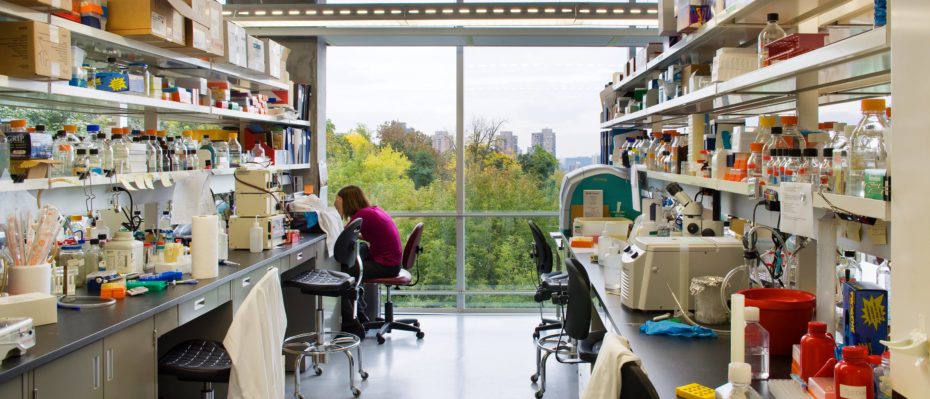
It’s been a whirlwind 12 months for McGill’s Goodman Cancer Research Centre. The GCRC spearheaded the launch of two consortiums that promise to improve patient care in Montreal and across Quebec. And those initiatives helped lay the groundwork for last month’s announcement by the Government of Canada that it will invest $150 million over five years to create the nation-wide Marathon of Hope Cancer Centres network.
The Marathon of Hope network, led by the Terry Fox Research Institute, will unite cancer centres across the country, accelerating implementation of precision medicine so that patients can access the right treatment at the right time for their particular cancer.
Data sharing, new technologies will benefit patients
Precision medicine is a promising framework for cancer research and care that factors in the genetic characteristics of each patient and their cancers to personalize treatments, making them more effective and reducing negative side-effects associated with current therapies.
Because the $150 million of federal funding will be matched by the network’s partners, the project represents a $300 million boost for cancer research across the country.
“It’s a game-changer,” says GCRC director Morag Park. “This initiative creates a tremendous opportunity to position Canada as a world leader in patient-centric cancer research. We are proud to play an important part in this venture that will ultimately lead to better outcomes for patients.”
The pan-Canadian network will bring together top centres and their researchers to share data and apply new technologies such as genomics, advanced imaging, big data and artificial intelligence for the benefit of patients.
Unprecedented collaboration
“I think the most important thing here is we’re building a cohort of patients across Canada,” Prof. Park says. That will help researchers puzzle out which subsets of patients respond to which treatments, for any given type of cancer. Because Canadian patients are treated through public healthcare systems with common standards across the country, she adds, this provides a powerful basis for developing precision medicine.
The Marathon of Hope builds on a series of initiatives in which the GCRC has played a key role, and which are also fostering unprecedented collaboration among leading Montreal institutions:
- In June 2018, the newly formed Montreal Cancer Consortium was awarded $6.5 million by the Terry Fox Research Institute. This funding supports four major projects – three of them led by GCRC researchers – aimed at understanding why some patients respond to a new cancer treatment strategy known as immunotherapy. In addition to McGill and the GCRC, the consortium includes the Centre de recherche du Centre hospitalier de l’Université de Montréal, Centre de Recherche Hôpital Maisonneuve-Rosemont, Institute for Research in Immunology and Cancer, Jewish General Hospital, the McGill Genome Centre, and the Research Institute of the McGill University Health Centre (RI-MUHC).
- In May 2019, an initiative led by Montreal artificial-intelligence company Imagia and the Terry Fox Research Institute – and including the GCRC – was awarded $49 million from the federal government’s Strategic Innovation Fund. The funding will support efforts to combine Canadian expertise in AI and precision medicine to improve healthcare for Canadians.
- The Québec Cancer Consortium for Novel Therapeutics and Biomarkers, a collaboration among six leading hospital and cancer research centre sites led by the GCRC, was awarded $10 million this June from the Ministère de l’Économie et de l’Innovation du Québec (MEI) through its Fonds d’accélération des collaborations en santé program. This award, together with contributions totaling $17.9 million from 12 private, public and non-profit partners, will be invested to double patient recruitment into oncology clinical trials and support development of personalized medicine and immunotherapies in Québec.
- Earlier this month, the Government of Canada announced funding of up to $6 million over four years for a team of scientists led by Dr. Nahum Sonenberg of the GCRC and Dr. Michael N. Pollak at the Lady Davis Institute (LDI) to develop a new way to treat metastatic breast cancer. The new approach, which targets messenger RNA (mRNA), strikes at the process that allows breast cancer to go from a localized problem to a potentially fatal disease. Dr. Josie Ursini-Siegel, also at the LDI, played a leading role in securing this new Stand Up to Cancer (SU2C) Canada Metastatic Breast Cancer Dream Team, which involves researchers from the GCRC as well as from leading institutions across the country, including the University of Alberta, the University of British Columbia and Princess Margaret Hospital at the University of Toronto.
On top of all those developments, GCRC researchers recently received support from the CQDM biopharma research consortium, the Canadian Cancer Society, and other funders for two ambitious projects:
- Park and her GCRC team are collaborating with Aspect Biosystems to reproduce tumours from living cells of breast cancer patients using Aspect’s microfluidic 3D bioprinting technology. This $2.2 million project will assess the efficacy of anti-cancer drugs and predict a patient’s response to treatment.
- Alain Nepveu from the GCRC and Dr. Michael Witcher of the Lady Davis Institute at the Jewish General Hospital are leading a $6.1 million collaborative project to develop novel drugs for the treatment of hard-to-treat breast cancers.
The Goodman Cancer Research Gala has also underpinned the GCRC’s recent achievements, Prof. Park notes. The biennial fundraising event, which has raised more than $10 million since its inception a decade ago, helps the Centre purchase sophisticated laboratory equipment and recruit leading scientists. Without that extra funding, she says, “there’s no way you can support this level of innovation and technology.” The next Gala is set for June 4, 2020.
